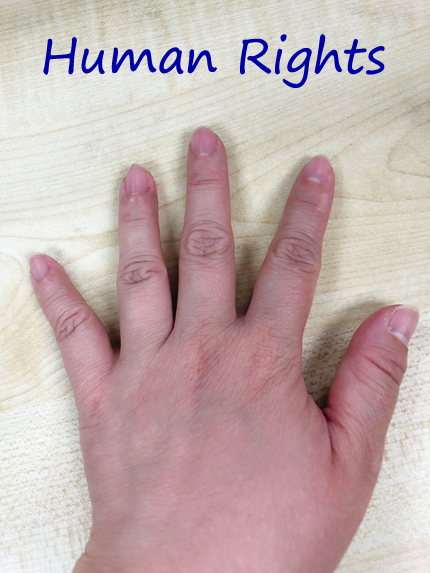Human rights hype isn't good for US or China
- By Caleb T. Maupin
 0 Comment(s)
0 Comment(s) Print
Print E-mail China.org.cn, May 2, 2018
E-mail China.org.cn, May 2, 2018

Human Rights [Photo by Xu Lin / China.org.cn]
The recently released "Country Reports on Human Rights for 2017" published by the U.S. State Department is yet another example of the flawed and ideologically loaded way the issue of human rights is interpreted by U.S. leaders.
The premise of the report, like so much human rights rhetoric from Western countries, is that the contemporary Western interpretation of human rights is eternal and universal and should apply to all countries in all circumstances. But these assumptions just don't match with reality.
For example: Is it not strange that concepts like human rights, civil liberties and natural law did not emerge until 1700s, if they are indeed universal to all human experience? Where was the concept of human rights for the thousands of years of human history preceding the decline of feudalism in Europe?
It should be noted that many of the concepts used in the report to criticize China and other countries have been re-defined and wrangled throughout the history of the U.S., during which there have been many examples of unlawful deprivation of life without due process, censorship, arbitrary arrest, corruption and much else besides. At various times, U.S. leaders often defended such actions as legal and justified. However, U.S. society has changed over time, as all societies do.
Today, the United States certainly has its own human rights problems, as China points out in its many Human Rights Reports on the country. When it comes to personal safety, economic security and infrastructure, the U.S. government often doesn't take adequate measures to fulfill its obligations to citizens. China has pointed out that the U.S. political system is "drowning in money," with the richest and most powerful utilizing the government to serve their ends. The U.S. police forces continue to escalate their level of brutality and misconduct in dealing with people, and videos of outrageous behavior from American police officers are all over social media.
Contrary to the simplistic narrative of Western ideology, human rights do not exist as a complete abstraction. The level of freedom in any society is based on the level of stability, safety, material abundance and overall development. China's leaders have expressed a desire to reform and improve their situation regarding human rights and realize the country has certain shortcomings. However, they have rejected the politicized nature of condemnations from the USA, which don't serve to improve things.
The Chinese Communist Party fits advancing and reforming human rights into its overall goals for the country. Human rights cannot be separated from the struggle to improve economic conditions. Franklin Delano Roosevelt, one of the most beloved presidents of the United States, was fully aware of this important relationship. He said, "People who are hungry and out of a job are the stuff of which dictatorships are made. In our day these economic truths have become accepted as self-evident."
Improving human rights in China, the U.S. and around the world is tightly bound up with eliminating poverty, advancing technology and raising the level of productive forces. While the U.S. has destroyed countries like Iraq, Libya and Afghanistan in the name of "spreading freedom" and "bringing democracy," the reality is that human rights and overall living conditions have gotten worse as a result. Meanwhile, China's Belt and Road Initiative, which brings infrastructure and development to impoverished countries, plays the opposite role, giving societies more stability and more of an opportunity to conduct political reform and modernization.
As China continues to rise up from poverty and fulfill its development goals and work with other countries to develop, its political system is changing and adapting. The people of the U.S. would benefit far more from cooperation with China and other countries to raise the level of economic development and ensure a greater level of freedom and economic security across the planet than from sententious condemnations.
Caleb Maupin is a journalist and political analyst who resides in New York City focusing on U.S. foreign policy and the global system of monopoly capitalism and imperialism.
Opinion articles reflect the views of their authors only, not necessarily those of China.org.cn.






Go to Forum >>0 Comment(s)